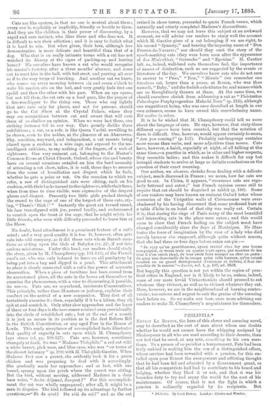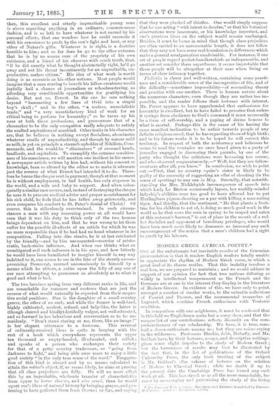PHILISTIA.*
ERNEST Ls BRETON, the hero of this clever and amusing novel, may be described as the sort of man about whom one doubts whether he would not sooner have the whipping assigned by Shakespeare to all who are used according to their deserts, than not feel that he owed, at any rate, something to his own exertions. To a person of so peculiar a temperament, Fate had been truly unkind in making him the son of a distinguished officer, whose services had been rewarded with a pension, for this entailed upon poor Ernest the ever-present and afflicting thought that he had been fed and educated by a Government grant, so that all his compatriots had had to contribute to his board and lodging, whether they liked it or not, and that it was his bounden duty to try and repay the world for the cost of his maintenance. Of course, that is not the light in which a pension is ordinarily regarded by its recipients. But • Phili:tia. By Cecil Power, London: Matto and Virindoa.
then, this excellent and utterly impracticable young man is above regarding anything in an ordinary, common-sense fashion, and is so loth to have whatever is not earned by his personal efforts, that one wonders how be could reconcile it with his conscience to profit by the sun's light and heat, or any other of Nature's gifts. Whatever is is right, is a doctrine horrible to him; and so far does he go to the other extreme, that he is by no means sure of the propriety of his own existence, and a friend of his observes with much truth, that, "if he did exactly what he thought abstractedly right, he'd go away and cut his throat incontinently for an unprofitable, unproductive, useless citizen." His idea of what work is worth doing is as eccentric as his other notions. Most people would imagine that a man craving to benefit his fellow-creatures would joyfully hail a chance of journalism or schoolmastering, as affording very considerable opportunities for gratifying his desire. But not so, Ernest. In the one he sees nothing beyond " hammering a few lines of Ovid into a stupid boy's skull ; " and in the other, " a useless, unsocialistic trade," and " a very unsatisfactory kind of work for an ethical being to perform for humanity ;" so he turns up his nose at both these professions, and pronounces that of a shoemaker to be the only occupation really adequate to satisfy the exalted aspirations of mankind. Other traits in his character are, that he believes in nothing except Socialism, abominates whatever smells of unproductivity, and though by nature mild as milk, is yet on principle a staunch upholder of Nihilists, Cornmunards, and the would-be " eliminators " of crowned heads, landlords, and capitalists. To exemplify the extreme sensitiveness of his conscience, we will mention one incident in his career. A newspaper article written by him had, without his consent or knowledge, been so altered by the editor as to make it advocate just the reverse of what Ernest had intended it to do. Therefore he burns the cheque sent in payment, though at that moment he is without employment, in bad health, has only sixpence in the world, and a wife and baby to support. And when subsequently a similar case occurs, and, instead of destroying the cheque he uses it to procure medical advice and proper nourishment for his sick child, he feels that he has fallen away grievously, and even compares his conduct to St. Peter's denial of Christ ! Of course, this is ridiculously overstrained. In such circumstances a man with any reasoning power at all would have seen that it was his duty to think only of the two human beings dependent on him, and that he was wrong.to let them suffer for the possible ill-effects of an article for which he was no more responsible than if be had had no hand whatever in its composition. Falling into dire straits, he is at last extricated by the friendly—and by him unsuspected—exercise of aristocratic, back-stairs influence. And when one thinks what an unmitigated evil such influence is in his eyes, and how bitterly he would have been humiliated to imagine himself in any way indebted to it, one seems to see in the fate of the sternly uncompromising Democrat, rescued unconsciously to himself by a means which he abhors, a satire upon the folly of any one of our race attempting to pronounce so absolutely as to what is good and what is bad.
The two heroines spring from very different ranks in life, and are remarkable for manners and customs that are just the reverse of what would naturally be expected from their respective social positions. One is the daughter of a small country grocer, the other of an earl; and while the former is well-bred, highly cultivated, modest, refined, and lady-like, the latter is (though shrewd and kindly) decidedly vulgar, not well-educated, and so forward in ber behaviour and conversation as to be unmaidenly. "Don't stand staring at me, there, like an image !"
is her elegant utterance to a footman. This reversal of ordinarily-received ideas is quite in keeping with the rest of a book which everywhere represents the upper ten thousand as empty-headed,. ill.educated, and selfish ; and speaks of a person who exchanges their society for that of a petty country tradesman, as "going from darkness to light," and being able once more to enjoy a little good society " in the only true sense of the word." Exaggeration of this kind is absurd and by uo means calculated to attain the writer's object, if, as seems likely, he aims at proving that all class prejudices are folly. He will no more effect this by an improbable, wholesale transfer of characteristics from upper to lower classes, and vice versli, than he would upset one's ideas of natural history by bringing grapes, and professing to have gathered them from thorns ; or figs, and saying that they were plucked off thistles. One would simply suppose that he was acting " with intent to deceive," or that his botanical observations were inaccurate, or his knowledge imperfect, and one's previous ideas on the subject would remain unchanged. Besides, it must be borne in mind that though class prejudices are often carried to an unreasonable length, it does not follow that they may not have some real foundation in differences which make a general amalgamation unadvisable. For instance, if one set of people regard pocket-handkerchiefs as indispensable, and another set consider them superfluous, it seems improbable that those people will be altogether at their ease when living on terms of close intimacy together.
Pltilisfia is clever and well-written, containing some yeastiness and a considerable sense of the incongruities of life, and of the difficulty—sometimes impossibility—of reconciling theory and practice with one another. There is human nature about the numerous characters, even though they are rather too impossible, and the reader follows their fortunes with interest. Mr. Power appears to have apprehended that enthusiasm for humanity is excellent, but to have failed to perceive that unless it springs from obedience to God's command it must necessarily be a form of self-worship, and a paying of divine honour to what is mortal. Perhaps this is the cause of his having the same manifest inclination to he unfair towards people of any definite religious creed, that he has regarding those of high birth; and in his future works it is to he hoped he will correct this tendency. In respect of both the aristocracy and believers he seems to need the reminder we once heard given to a party of juveniles engaged in discussing their parents, by one of the party who thought the criticisms were becoming too severe, and who observed magnanimously,—" Well, but they are fellowcreatures after all, you know." In conclusion, we wish to point out :—First, that no country squire's sister is likely to he guilty of the enormity of suggesting an offer of shooting (in the sense of sporting) to any one in Hay. Secondly, that notwithstanding the Mrs. Nicklebyish inconsequence of speech into which Lady Le Breton occasionally lapses, her worldly-minded ladyship's abilities were too good to have allowed her to put Hurlingham pigeon-shooting on a par with killing a man-eating tiger. And thirdly, that the sentiment, "He that plants a fruittree for his children to eat of, is doing as much good work in the world as he that sows the corn in spring to be reaped and eaten at this autumn's harvest," is out of place in the mouth of a redhot Socialist and opponent of hereditary privileges, who would have been much more likely to denounce as immoral any such encouragement of the notion that a man's children had a right to profit by his labours.



































 Previous page
Previous page